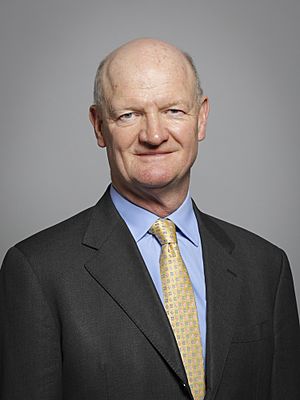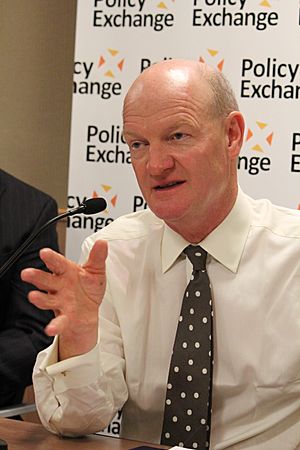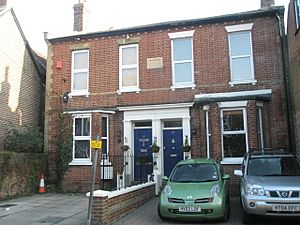David Willetts facts for kids
Quick facts for kids
The Lord Willetts
|
|||||||||||||||||||||||||||||||||||||||||||||||||||||||
|---|---|---|---|---|---|---|---|---|---|---|---|---|---|---|---|---|---|---|---|---|---|---|---|---|---|---|---|---|---|---|---|---|---|---|---|---|---|---|---|---|---|---|---|---|---|---|---|---|---|---|---|---|---|---|---|

Official portrait, 2020
|
|||||||||||||||||||||||||||||||||||||||||||||||||||||||
| Minister of State for Universities and Science | |||||||||||||||||||||||||||||||||||||||||||||||||||||||
| In office 11 May 2010 – 14 July 2014 |
|||||||||||||||||||||||||||||||||||||||||||||||||||||||
| Prime Minister | David Cameron | ||||||||||||||||||||||||||||||||||||||||||||||||||||||
| Preceded by | David Lammy | ||||||||||||||||||||||||||||||||||||||||||||||||||||||
| Succeeded by | Greg Clark | ||||||||||||||||||||||||||||||||||||||||||||||||||||||
| Paymaster General | |||||||||||||||||||||||||||||||||||||||||||||||||||||||
| In office 20 July 1996 – 21 November 1996 |
|||||||||||||||||||||||||||||||||||||||||||||||||||||||
| Leader | John Major | ||||||||||||||||||||||||||||||||||||||||||||||||||||||
| Preceded by | David Heathcoat-Amory | ||||||||||||||||||||||||||||||||||||||||||||||||||||||
| Succeeded by | Michael Bates | ||||||||||||||||||||||||||||||||||||||||||||||||||||||
| Lord Commissioner of the Treasury | |||||||||||||||||||||||||||||||||||||||||||||||||||||||
| In office 6 July 1995 – 28 November 1995 |
|||||||||||||||||||||||||||||||||||||||||||||||||||||||
| Prime Minister | John Major | ||||||||||||||||||||||||||||||||||||||||||||||||||||||
| Preceded by | Andrew Mitchell | ||||||||||||||||||||||||||||||||||||||||||||||||||||||
| Succeeded by | Liam Fox | ||||||||||||||||||||||||||||||||||||||||||||||||||||||
|
|||||||||||||||||||||||||||||||||||||||||||||||||||||||
| Member of the House of Lords Lord Temporal |
|||||||||||||||||||||||||||||||||||||||||||||||||||||||
| Assumed office 16 October 2015 Life Peerage |
|||||||||||||||||||||||||||||||||||||||||||||||||||||||
| Member of Parliament for Havant |
|||||||||||||||||||||||||||||||||||||||||||||||||||||||
| In office 9 April 1992 – 30 March 2015 |
|||||||||||||||||||||||||||||||||||||||||||||||||||||||
| Preceded by | Ian Lloyd | ||||||||||||||||||||||||||||||||||||||||||||||||||||||
| Succeeded by | Alan Mak | ||||||||||||||||||||||||||||||||||||||||||||||||||||||
| Personal details | |||||||||||||||||||||||||||||||||||||||||||||||||||||||
| Born |
David Linsay Willetts
9 March 1956 Birmingham, England |
||||||||||||||||||||||||||||||||||||||||||||||||||||||
| Political party | Conservative | ||||||||||||||||||||||||||||||||||||||||||||||||||||||
| Spouse | Sarah Butterfield | ||||||||||||||||||||||||||||||||||||||||||||||||||||||
| Education | King Edward's School, Birmingham | ||||||||||||||||||||||||||||||||||||||||||||||||||||||
| Alma mater | University of Oxford (BA) | ||||||||||||||||||||||||||||||||||||||||||||||||||||||
David Linsay Willetts, Baron Willetts, (born 9 March 1956) is a British politician and a member of the House of Lords. For many years, he was a Member of Parliament (MP) for the Conservative Party. An MP is a person elected to represent their local area, called a constituency, in the House of Commons.
From 1992 to 2015, Willetts represented the constituency of Havant in Hampshire. He was the Minister of State for Universities and Science from 2010 to 2014. After leaving the House of Commons, he became a life peer, which means he has a seat in the House of Lords for the rest of his life. He is also the president of a research group called the Resolution Foundation.
Contents
Early Life and Education
David Willetts was born in Birmingham, England. He went to King Edward's School in Birmingham. After that, he studied philosophy, politics and economics (often called PPE) at Christ Church, Oxford, one of the colleges of the University of Oxford. He did very well and graduated with a first-class degree, the highest grade possible.
Start in Politics
After university, Willetts began working in politics. He was a researcher for a senior politician named Nigel Lawson. At age 28, he started working in the Policy Unit for Prime Minister Margaret Thatcher. This group helped the prime minister develop new ideas and policies for the country.
Later, at age 31, he became the head of a think tank called the Centre for Policy Studies. A think tank is an organization that researches and develops ideas on topics like politics and the economy.
Member of Parliament
In 1992, at the age of 36, Willetts was elected as the Member of Parliament for Havant. He was known for being very intelligent, and people gave him the nickname "Two Brains."
Early Government Roles
As an MP, Willetts was given several important jobs. He became a minister in the Cabinet Office and was later made Paymaster General. This was a role that helped coordinate the government's policies.
However, in 1996, he had to resign from this job. A committee found that he had not been completely clear in his statements during an investigation about another politician.
In the Shadow Cabinet
After the 1997 election, the Conservative Party was no longer in government. They became the main opposition party. Willetts was given a senior role in the Shadow Cabinet. The Shadow Cabinet is a team of politicians from the opposition party who "shadow" the government ministers. They challenge the government's plans and develop their own policies.
Willetts served in several shadow roles, including Shadow Education Secretary and Shadow Work and Pensions Secretary. He became known as an expert on pensions and benefits.
Minister for Universities and Science
After the 2010 election, the Conservatives formed a government with another party. The new Prime Minister, David Cameron, appointed Willetts as the Minister of State for Universities and Science.
In this role, he was in charge of government policy for higher education and scientific research. One of his most well-known policies was to increase the maximum amount that universities in England and Wales could charge students for tuition fees. This was a major change to how university education was funded.
Life After Parliament
Willetts decided not to run for re-election as an MP in the 2015 general election. He said it was time to "move onto fresh challenges." In 2015, he was made a life peer and became Baron Willetts, giving him a seat in the House of Lords.
Since leaving the House of Commons, he has taken on many new roles. He is the president of the Resolution Foundation, a think tank that studies how to improve life for people with low to middle incomes. He is also a visiting professor at King's College London and is involved with other educational groups. In 2022, he became the chair of the board for the UK Space Agency.
Main Ideas: Civic Conservatism
Willetts is known for developing an idea called "civic conservatism." This idea focuses on the importance of groups and institutions that exist between individuals and the government. These include families, local communities, charities, and volunteer groups.
He believes that these groups are very important for a strong society. This way of thinking has influenced the Conservative Party to focus more on local communities and voluntary organizations. Some people have called Willetts "the real father of Cameronism" because his ideas were important to the modern Conservative Party led by David Cameron.
Personal Life
Willetts is married to Sarah Butterfield, who is an artist. They have a daughter and a son.
Honours
Willetts has received many honours for his work in politics and education.
University Degrees
| Location | Date | School | Degree |
|---|---|---|---|
| Christ Church, Oxford | First-class honours Bachelor of Arts (BA) in PPE |
Honorary Degrees
An honorary degree is awarded to recognize a person's achievements, without them having to study for it.
| Location | Date | School | Degree |
|---|---|---|---|
| 21 November 2014 | University of Bedfordshire | Doctor of Arts (D.Arts) | |
| 17 July 2016 | University of Leicester | Doctor of Laws (LL.D.) | |
| 4 July 2017 | University of Bath | Doctor of Laws (LL.D.) | |
| 2017 | Richmond, The American International University in London | Doctor of Public Administration (DPA) | |
| 2017 | University of Chester | Doctor of Letters (D.Litt.) |
Memberships and Fellowships
Willetts has been elected as a fellow of several important academic groups, which is a high honour for his contributions to science and learning.
| Country | Date | Organisation | Position |
|---|---|---|---|
| 2014 – | Academy of Social Sciences | Fellow (FAcSS) | |
| 2016 – | Academy of Medical Sciences | Honorary Fellow (FMedSci) | |
| 2017 – | Royal Society of Chemistry | Honorary Fellow (HonFRSC) | |
| 2018 – | Royal Society | Honorary Fellow (FRS) | |
| 2023 – | Royal Academy of Engineering | Honorary Fellow (FREng) |
 | Sharif Bey |
 | Hale Woodruff |
 | Richmond Barthé |
 | Purvis Young |



